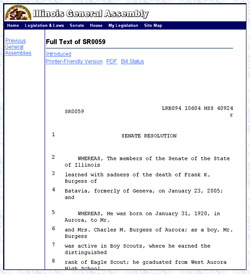Jeff Bockman just posted a good article which he astutely titled “Whereas.” Originally printed in the September/October 2008 issue of Everton’s Genealogical Helper, the article deals with memorial resolutions made by governmental bodies, using a resolution of the Senate of Illinois as an initial example. Jeff notes that these resolutions were not only produced by governmental bodies, but by professional and educational organizations & institutions – and others. These types of records are found all over the Internet, including books digitized by Google.
Following is an excerpt from “Whereas.”
How are they Submitted?
As with any genealogical source it is a good idea to have at least a basic understanding of why and how a record was created.
Associations: Members of the governing body or the organization’s board submit the memorial resolutions, usually for deceased members.
Government: Anyone who has done any US courthouse research is well aware of the fact that while we are the United States there is nothing united about how state governments or even county governments work. At the Minnesota Office of the Revisor of Statutes, there is a section “6.1 on Uses of Resolutions.”
“Memorial resolutions, also called memorials, are used to make any statement that asks another government official or body to act. The typical memorial resolution is directed to Congress and asks for a change in law or federal policy. Requests for federal constitutional amendments, federal rule changes, state departmental actions, or actions by the governor are all appropriate matters for memorial resolutions. Memorial resolutions must be in bill form and follow bill procedure.”
“Memorial resolutions addressed to the President or the Congress of the United States, or a house or member of Congress, or a department or officer of the United States, or a state or foreign government must follow the same procedure as bills before being adopted.”
The clerk at my local state senator’s office said that state senators or representatives submit them for some of the more prominent deaths in their district. They can be acquaintances, the death of an active military person from the district that was found from an obituary, or for someone brought to their attention by a constituent. While they have to go through the full legal process these are usually passed quickly. If you locate a memorial resolution then see who sponsored the bill and contact them because they would have copies of any obituaries or letters that started the process.
At the Federal level, members of the House of Representatives issue statements and have them entered into the record rather than go through the lengthy process to pass a resolution. A Google search for (“passing of” site: www.house.gov/) found 697 entries. They are mostly statements on the passing of members, former members, friends, politicians, and celebrities. Some of the search results were not memorials but referred to the passing of a bill.
Read the full article at Jeff’s “Genealogy According to Jeff” website. Click on the link for Memorial Resolutions.
